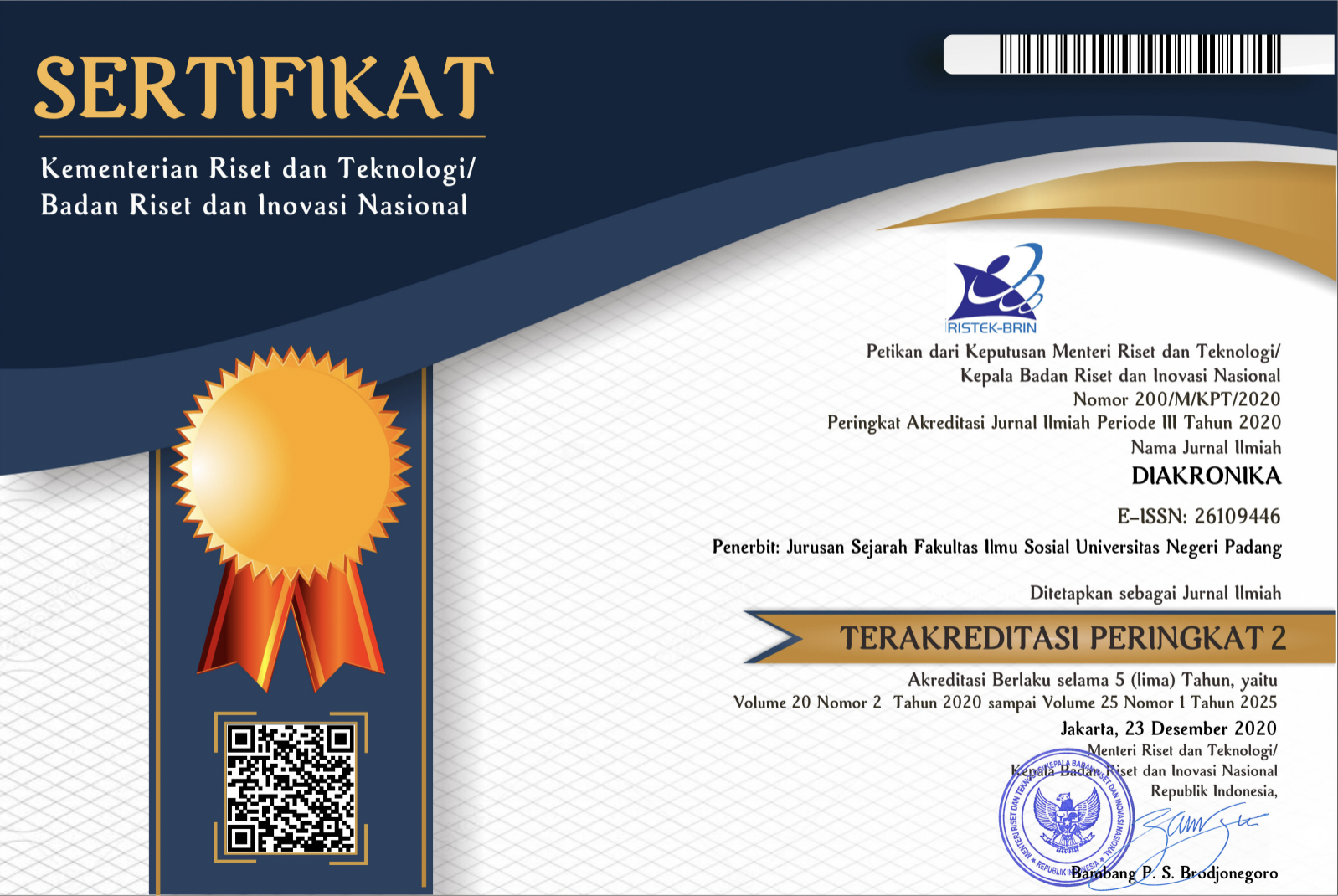Integrasi Life Skills Education dalam Pembelajaran Sejarah
Abstract
Education is an effort of knowledge in human nature to have various beneficial skills for the future. One by-type of this education is life skills education. Furthermore, education requires an actualization process through activities such as history learning. History learning is a process of a causal relationship between the past, present, and future to improve students’ soft skills. Thus, the method used in this research is qualitative with an instrumental case study approach at SMA N 1 Boyolali to provide an overview of the integration of life skills education in history learning. Data sources in this article are interviews, questionnaires, observations, and documentation. The data obtained analyze through interactive data analysis with the Nvivo 12 Pro software application in data reduction and display data. The article concludes that the integration of life skills education in history learning can improve students' soft skills consisting of personal, interpersonal, and cognitive skills.
Downloads
References
Banghart, F. W., & Trull, A. J. (1973). Educational Planning. The Macmillan Comapany.
Browning, M. H. E. M., Larson, L. R., Sharaievska, I., Rigolon, A., McAnirlin, O., Mullenbach, L., Cloutier, S., Vu, T. M., Thomsen, J., Reigner, N., Metcalf, E. C., D’Antonio, A., Helbich, M., Bratman, G. N., & Alvarez, H. O. (2021). Psychological impacts from COVID-19 among university students: Risk factors across seven states in the United States. Plos One, 16(1), 1–27. https://doi.org/10.1371/journal.pone.0245327
Creswell, J. W. (2009). Qualitative Inquiry and Research Design: Choosing Among Five Approaches. In Sage Publications (3nd ed). Sage Publications.
Creswell, J. W. (2012). Educational Research: Planning, Conducting and Evaluating Quantitative and Qualitative Research (4nd ed). Pearson Education.
Cronin, L., Allen, J., Ellison, P., Marchant, D., Levy, A., & Harwood, C. (2019). Development and initial validation of the life skills ability scale for higher education students. Studies in Higher Education, 1–14. https://doi.org/10.1080/03075079.2019.1672641
Davies, I. (2011). Debates in History Teaching. Routledge.
Denzin, N. K., & Lincoln, Y. S. (2005). Handbook of Qualitative Research (3nd ed). Sage Publications.
Dwivedi, Y. K., Hughes, D. L., Coombs, C., Constantiou, I., Duan, Y., Edwards, J. S., Gupta, B., Lal, B., Misra, S., Prashant, P., Raman, R., Rana, N. P., Sharma, S. K., & Upadhyay, N. (2020). International Journal of Information Management Impact of COVID-19 pandemic on information management research and practice: Transforming education, work and life. International Journal of Information Management, 55(July), 1–20. https://doi.org/10.1016/j.ijinfomgt.2020.102211
Harapan, H., Wagner, A. L., Yufika, A., Winardi, W., Anwar, S., Gan, A. K., Setiawan, A. M., Sofyan, H., Vo, T. Q., Hadisoemarto, P. F., Müller, R., Groneberg, D. A., Mudatsir, M., Harapan, H., Wagner, A. L., Yufika, A., Winardi, W., Gan, A. K., Setiawan, A. M., … Mudatsir, M. (2020). Willingness-to-pay for a COVID-19 vaccine and its associated determinants in Indonesia. Human Vaccines & Immunotherapeutics, 00(00), 1–7. https://doi.org/10.1080/21645515.2020.1819741
Hardikar, G., Nair, A. R., & Ranjan, S. (2020). National Education Policy 2020 and Inclusion of Life Skills Education in Curricula: The Way Forward. International Journal of Life Skills Education, 6(2), 75–86.
Ifdil, I., Fadli, R. P., Suranata, K., Zola, N., & Ardi, Z. (2020). Online mental health services in Indonesia during the COVID-19 outbreak. Asian Journal of Psychiatry, 51(April), 1876–2018. https://doi.org/10.1016/j.ajp.2020.102153
Kadji, Y. (2015). Formulasi dan Implementasi Kebijakan Publik Kepemimpinan Perilaku Birokrasi dalam Fakta Realitas. UNG Press Gorontalo.
Karima, E. M., Basri, W., & Astriani, F. (2021). EDUCATIONAL THEORY APPLICATION IN HISTORY LEARNING. Santhet:(Jurnal Sejarah, Pendidikan, Dan Humaniora), 5(2), 115–124.
Karima, E. M., & Firza, F. (2018). The Effect of Lectures and Question-Answer Methods of Teaching toStudents’ Historical Thinking on History. ICSScE 2018.
Kemendigbud. (2020). Keputusan Menteri Pendidikan dan Kebudayaan Repubik Indonesia Nomor 719/P/2O2O Tentang Pedoman Pelaksanaan Kurikulum pada Satuan Pendidikan dalam Kondisi Khusus.
Kumar, S. (2020). Prerequisite of Life Skills Education for Citizenship Development. In International Journal of Life Skills Education (Vol. 6, Issue 2).
Miles, M. B., Huberman, A. M., & Saldana, J. (2014). Qualitative Data Analysis: A Methods Sourcebook (3nd ed). Sage Publications.
Moore, K. D. (2014). Effective Instructional Strategies. Sage Publications.
MSMI, D. (2020). Enhancing Academic Performance through Life Skills Education: A Conceptual Study. International Journal of Life Skills Education, 6(2), 24–34.
Nair, A. R., & Ranjan, S. (2020). Life Skills Education: Origin and Development of the Concept. International Journal of Life Skills Education, 6(2), 5–23.
OECD. (2018). What 15-year-old students in Indonesia know and can do. In PISA.
Osborne, M., Houston, M., & Toman, N. (2007). The Pedagogy of Lifelong Learning: Understanding Effective Teaching and Learning in Diverse Contexts. Routledge. https://doi.org/10.4324/9780203945292
Rios, J. A., Ling, G., Pugh, R., Becker, D., & Bacall, A. (2020). Identifying Critical 21st-Century Skills for Workplace Success: A Content Analysis of Job Advertisements. Educational Researcher, 49(2), 80–89. https://doi.org/10.3102/0013189X19890600
Sari, D. K., Amelia, R., Dharmajaya, R., Sari, L. M., & Fitri, N. K. (2020). Positive Correlation Between General Public Knowledge and Attitudes Regarding COVID 19 Outbreak 1 Month After First Cases Reported in Indonesia. Journal of Community Health, 1–8. https://doi.org/10.1007/s10900-020-00866-0
Schleicher, A. (2019). PISA 2018: insights and interpretations. OECD Publishing, 1–64.
Schoon, I., Nasim, B., Sehmi, R., & Cook, R. (2015). The Impact of Early Life Skills on Later Outcomes.
Shahidi, S. H., Stewart Williams, J., & Hassani, F. (2020). Physical activity during COVID-19 quarantine. Acta Paediatrica, International Journal of Paediatrics, 109(10), 2147–2148. https://doi.org/10.1111/apa.15420
Siste, K., Hana, E., Sen, L. T., Christian, H., Siswidiani, L. P., Limawan, A. P., & Murtani, B. J. (2020). The Impact of Physical Distancing and Associated Factors Towards Internet Addiction Among Adults in Indonesia During COVID-19 Pandemic: A Nationwide Web-Based Study. Frontiers in Psychiatry, 11(September), 1–11. https://doi.org/10.3389/fpsyt.2020.580977
Stake, R. E. (1920). Investigacion con estodio de cansos (2nd ed). Morata.
Trilling, B., & Fadel, C. (2009). 21st Century Skills_ Learning for Life in Our Times. In Journal of Sustainable Development Education and Research. Jossey-Bass.
UNICEF. (2012). Global Evaluation of Life Skills Education Programmes.
UNICEF. (2015). The Investment Case for Education and Equity.
WHO. (1993). Training Workshops for The Development and Implementation of Life Skills Program.
WHO. (2020). Coronavirus Disease (COVID-19).
Yin, R. K. (2014). Case Study Research: Design and Methods (5nd ed). Sage Publications.




